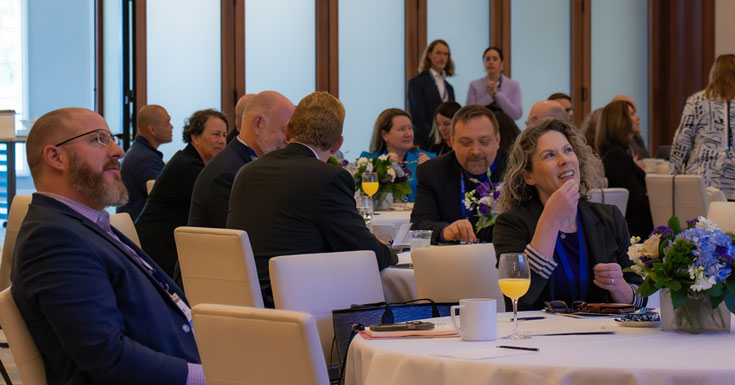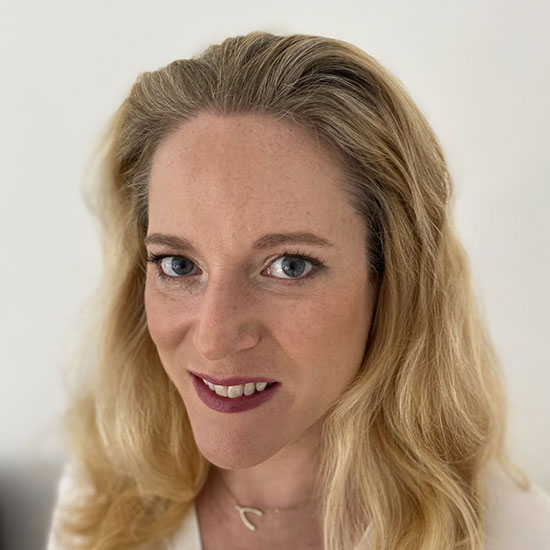Tambellini Group’s First Future Campus™ Summit: Making Mindset Shifts to Empower Innovation and Growth in Higher Education
Former Tambellini Author

There is a virtually unanimous consensus among higher education leaders that the magnitude and volume of external forces impacting their industry demand significant and swift shifts in how their institutions operate and evolve. But crucial questions remain unanswered:
- How do they change and adapt on both strategic and tactical levels to future-proof their institutions?
- Where should leaders prioritize their efforts and limited resources for the most impact to ensure sustainability and growth for years to come?
To help answer those questions, Tambellini Group held its first Future Campus™ Summit last week in California, bringing together nearly 100 innovative cabinet-level institutional leaders from across North America with Tambellini analysts and higher education experts for a series of interactive workshops and inspirational speakers.
The summit was unique because the participants represented a broad spectrum of senior leaders. While most conferences are limited to professionals from a specific functional area, Tambellini’s Future Campus Summit: Leading with Analytics and AI attracted a mix of key executive leaders, including presidents, CFOs, CIOs, enrollment management VPs, and provosts. This diversity was intentional by design to help participants expand their knowledge of the nuanced dynamics and varying demands their colleagues face across organizational siloes.
“Attending this summit opened my eyes to the challenges and opportunities facing other leaders at my institution,” said Michael Latsko, VP and Chief Human Resource Officer at Arizona State University.
Building Consensus to Tackle Pressing Challenges
By engaging in problem-solving activities with their colleagues, participants had the opportunity to learn from the opinions and perspectives of others outside their institutions, where politically charged environments may make them hesitant to freely share parallel concerns.
According to Paul Robinson, AVP for Enrollment Management at the University of Michigan, Ann Arbor, “Interacting with and learning from diverse leaders in education and the private sector through discussing challenges and opportunities facing higher education was invaluable.”
Institutional leaders found exceptional value when engaging in a collaborative executive leadership strategy tabletop exercise created by Tambellini Group. Groups of four leaders representing different functional areas were given a deck of cards with a series of common scenarios across the ten priority workspaces Tambellini has identified as crucial for institutions to focus on to ensure their future growth and sustainability.
For each scenario, leaders were challenged to build consensus on issues to bear in mind from various perspectives, as well as opportunities and risks to consider. Using that information, they formulated strategic action plans for moving forward. Based on the tangible outcomes of this activity, many participants planned to incorporate the exercise into future team-building exercises at their institutions.
“We facilitated a more comprehensive understanding of the alignment required across different institutional siloes,” said Hampton Shive, Strategic Advisor at Tambellini Group. “This is a first and crucial step for institutional leaders to coordinate within senior teams across the domains of people, process, data, and technology—a cornerstone of coordinated and sustained innovation and progress.”
Three Key Future Campus™ Summit Takeaways
Future Campus™ Summit workshops and sessions focused on shifting mindsets and taking action around the ten priorities Tambellini Group has identified as essential target areas for institutions to address to ensure their resilience, sustainability, and a culture of innovation as they respond to current and future challenges. Here are three key takeaways from the Summit:
1. Rethinking Relationships with Technology Vendors
The Outdated Paradigm: Many institutions have purely transactional seller-buyer relationships with their technology solutions providers. This dynamic made more sense when they invested in on-premise legacy platforms and relied on their internal staff to maintain and customize those solutions for their unique needs.
The Innovative Future Campus Mindset: The proliferation of continuously iterating SaaS solutions requires institutions to work with their solution providers as partners in innovation to ensure their products evolve to meet their shifting and growing needs.
Tom Andriola, Vice Chancellor for Information Technology and Data and Chief Digital Officer at the University of California, Irvine, encouraged leaders to forge long-term collaborative partnerships with technology vendors to drive innovation. He also urged them to focus on optimizing large-scale technology platforms to meet future needs instead of implementing smaller niche solutions that address short-term problems but require more complex integration.
2. Rethinking Resource Limitations
The Outdated Paradigm: Budget cuts and tuition revenue downturns have led to a broad mandate to do more with less, prompting many leaders to assume they cannot move forward on modernizing their technology stacks at the pace and scale required. A similar sentiment often applies when innovative and ambitious projects are proposed—they would be great for an institution but aren’t feasible because resources are lacking.
The Innovative Future Campus Mindset: Keynote speaker Dr. Laura Huang, Distinguished Professor and Faculty Director of Women’s Entrepreneurship Initiative at Northeastern University, shared an example from her entrepreneurship class, where each student is given an envelope with seed capital to start and grow an enterprise of their choosing over two weeks. The students who consistently make the highest returns on the project are the ones who forge ahead with their ideas without opening the envelope. Her message to leaders? Focusing solely on perceived resources can create more of a barrier than a benefit because it limits them from taking on more ambitious initiatives. Look to the art of the possible.
3. Rethinking AI Regulation and Usage
The Outdated Paradigm: Concerns about academic integrity and students over-relying on generative AI tools like Chat GPT to complete writing assignments prompted faculty and provosts to focus on finding ways to control and limit the usage of this technology in teaching and learning.
The Innovative Future Campus Mindset: Over the past year, forward-thinking faculty have found ways to incorporate generative AI applications into their curricula and assignments, and various speakers encouraged Summit attendees to move from a controlling approach to cautious curiosity. While ethical concerns and data privacy issues should always be carefully considered, institutions should lean into AI tools and experiment to understand their applications, which will inform how they shape policies surrounding their usage.
Interested in learning more about how your institution can adapt and thrive by adopting a Future Campus™ mindset? Download our white paper Predictions and Recommendations: A Blueprint for Taking Action and Driving Success in 2024 and Beyond. And be sure to check back here in the coming weeks for more information about registering for our next Future Campus Summit in New York, June 26th to 27th.
Categories
Share Article:

Other Posts From this Author:
© Copyright 2025, The Tambellini Group. All Rights Reserved.